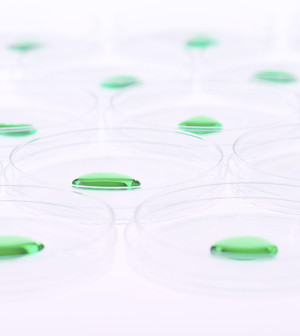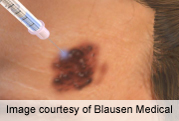- Could Your Grocery Store Meat Be Causing Recurring UTIs?
- Are You Making This Expensive Thermostat Error This Winter?
- Recognizing the Signs of Hypothyroidism
- 10 Strategies to Overcome Insomnia
- Could Artificial Sweeteners Be Aging the Brain Faster?
- Techniques for Soothing Your Nervous System
- Does the Water in Your House Smell Funny? Here’s Why
- Can a Daily Dose of Apple Cider Vinegar Actually Aid Weight Loss?
- 6 Health Beverages That Can Actually Spike Your Blood Sugar
- Treatment Options for Social Anxiety Disorder
Combo Treatment for Advanced Melanoma Seems to Improve Survival


Patients with advanced melanoma may live longer when treated with a combination of the cancer drug Yervoy and the immune system booster sargramostim, a new study finds.
Patients given the two drugs had a median survival of 17.5 months, compared to 12.7 months for those on Yervoy (ipilimumab) alone. At one year, overall survival was nearly 69 percent for those on the combination therapy, versus 53 percent for those on Yervoy alone, the researchers said.
“Patients did live longer, as well as having less serious side effects, when given the combination,” said lead researcher Dr. F. Stephen Hodi, an assistant professor of medicine at the Dana-Farber Cancer Institute in Boston.
Melanoma is the most serious form of skin cancer. In the United States, more than 12,000 people die from advanced melanoma each year, the U.S. Centers for Disease Control and Prevention reports.
Caught early, melanoma is treatable. And advances such as this one just reported, if replicated in future studies, could alter the bleak outlook for patients with melanoma that has spread, experts said.
Hodi believes that combination therapy has the potential for extending life in patients with this deadly disease.
“The future is really with combination therapies, how we combine targeted therapies, and the results of this trial suggest that the combination of sargramostim and ipilimumab should be part of that mix,” Hodi said.
Melanoma might one day become a cancer people can live with, said Dr. Doris Day, a dermatologist at Lenox Hill Hospital in New York City.
“It’s exciting to know that we are making such important progress in an otherwise terminal condition where traditional chemotherapy and radiation are essentially useless,” Day said.
Hodi said he doesn’t know whether starting combination therapy before melanoma spreads will improve survival even more, but Day thinks it will.
“If patients are treated at diagnosis or after surgery, they may have a better outcome,” Day said.
For this study — published Nov. 5 in the Journal of the American Medical Association — Hodi’s team randomly assigned 245 patients with advanced melanoma to treatment with intravenous Yervoy alone or Yervoy plus injections of sargramostim.
While the dual-therapy group tended to live longer, both groups had similar time-to-disease progression — a little more than three months, the study found.
Also, fewer patients on the drug combination suffered serious gastrointestinal problems, Hodi said.
Dr. Mario Sznol, a professor of medical oncology at the Yale School of Medicine, said that newer drugs might be even more effective than the two used in this study.
“Overall, these are interesting results from a well-conducted, large phase 2 trial, but the field has moved so quickly that it may be difficult to follow up on the results,” he said.
Either nivolumab or pembrolizumab (Keytruda) — new drugs for advanced melanoma — used alone will probably be more effective and less toxic, Sznol said. Also, early trial results suggest the combination of Yervoy and nivolumab will perform even better than the two evaluated in this study or either of the two newer drugs alone, he said.
“So these results, even if confirmed, are not as important as they would have been several years ago,” Sznol said.
Melanoma is a cancer that can be prevented by being “sun smart,” Day said. That means using sunscreen and taking other precautions to avoid prolonged sun exposure.
More information
For more about melanoma, visit the U.S. National Cancer Institute .
Source: HealthDay
Copyright © 2026 HealthDay. All rights reserved.










